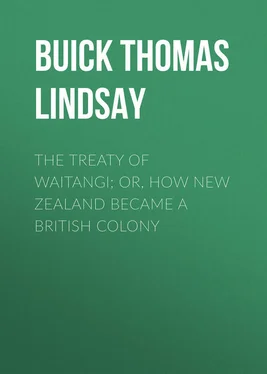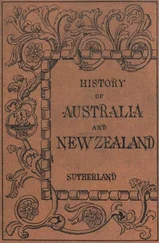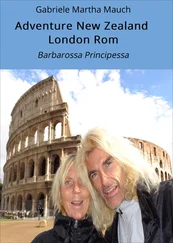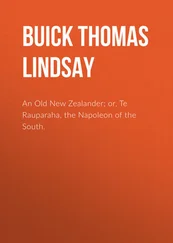Thomas Buick - The Treaty of Waitangi; or, how New Zealand became a British Colony
Здесь есть возможность читать онлайн «Thomas Buick - The Treaty of Waitangi; or, how New Zealand became a British Colony» — ознакомительный отрывок электронной книги совершенно бесплатно, а после прочтения отрывка купить полную версию. В некоторых случаях можно слушать аудио, скачать через торрент в формате fb2 и присутствует краткое содержание. Жанр: foreign_antique, foreign_prose, на английском языке. Описание произведения, (предисловие) а так же отзывы посетителей доступны на портале библиотеки ЛибКат.
- Название:The Treaty of Waitangi; or, how New Zealand became a British Colony
- Автор:
- Жанр:
- Год:неизвестен
- ISBN:нет данных
- Рейтинг книги:5 / 5. Голосов: 1
-
Избранное:Добавить в избранное
- Отзывы:
-
Ваша оценка:
- 100
- 1
- 2
- 3
- 4
- 5
The Treaty of Waitangi; or, how New Zealand became a British Colony: краткое содержание, описание и аннотация
Предлагаем к чтению аннотацию, описание, краткое содержание или предисловие (зависит от того, что написал сам автор книги «The Treaty of Waitangi; or, how New Zealand became a British Colony»). Если вы не нашли необходимую информацию о книге — напишите в комментариях, мы постараемся отыскать её.
The Treaty of Waitangi; or, how New Zealand became a British Colony — читать онлайн ознакомительный отрывок
Ниже представлен текст книги, разбитый по страницам. Система сохранения места последней прочитанной страницы, позволяет с удобством читать онлайн бесплатно книгу «The Treaty of Waitangi; or, how New Zealand became a British Colony», без необходимости каждый раз заново искать на чём Вы остановились. Поставьте закладку, и сможете в любой момент перейти на страницу, на которой закончили чтение.
Интервал:
Закладка:
This gentleman at once adopted an attitude of hostility to the whole proposal, his objections being primarily that the jealousy of foreign powers might be excited by the extension of British colonies; that England had colonies enough; that they were very expensive to govern and to manage; and that they were not of sufficient value to make it worth while to increase their number. 31 31 Lord Glenelg did not on this occasion urge as an objection that New Zealand was not a part of the British Empire.
The rebuttal of these unexpected objections involved a discussion of over an hour, during which considerable feeling was displayed by some of the gentlemen present, who saw in the attitude of the Minister a grim prospect of their scheme being thwarted. Several of these had, during the interval since the previous interview, disposed of their property and quitted professions in which they were engaged, with a view to emigrating, and they now felt very strongly the position in which they were placed by the withdrawal of the Ministerial approval which they believed their enterprise was to receive. One of these was described to Lord Melbourne as having wound up his affairs with a view to emigrating, and as being likely to suffer very seriously from now finding himself unable to carry his plan into effect. Lord Melbourne, not knowing that he was present, said that such an individual must be mad. The gentleman immediately rose and, facing the Premier, said that he was the madman. This created a distinctly dramatic situation, and the conference was on the point of breaking up in excitement and disorder when Lord Melbourne was reminded of his former sympathetic reception of the Association's proposals, whereupon he held a further brief consultation with the leaders of the deputation, and gave them to understand that the matter would be again considered by the Government, and that if they would wait upon Lord Glenelg in a week's time they would get an answer more to their satisfaction. Pursuant to that arrangement, the same body of persons waited on the Colonial Secretary on that day week (Wednesday, December 20), when Lord Glenelg informed them that the subject of the colonisation of New Zealand had been reconsidered by the Cabinet, and that circumstances which had occurred during the interval had induced Ministers to think that their former view was not the correct one. What had happened to so influence the Ministerial mind was the receipt of those important despatches from Mr. Busby, the British Resident, and from Captain Hobson, in which both these officers urged the need for a more vigorous policy on the part of the Colonial Office in its relations with New Zealand. The opinions of the Government, therefore, now approximated somewhat more closely to those of the Association, but there was still some hesitancy in proceeding by way of Act of Parliament. The Colonial Department, Lord Glenelg said, had fully considered the matter, and were satisfied that the measures desired might be carried into complete effect without applying to Parliament at all; and that they were consequently prepared, in the exercise of the power of the Crown vested in the Secretary of State for the Colonial Department, to give to the Association a Charter of Incorporation, being a Charter of government similar to those which were granted in the sixteenth and seventeenth centuries to the companies which founded the thirteen great colonies in America. Nine days after this interview the Association received an official letter from Lord Glenelg, reiterating his offer of a Charter, and calling upon the committee to form their members into a Joint-Stock Company with a subscribed capital sufficient to qualify them for the Charter he proposed to issue. This proposition was wholly unacceptable to the Association for two vital reasons. They had from the beginning declared that they intended to take no private pecuniary interest in the undertaking, and yet in spite of their care in this direction they had been very untruly charged before the public with having no other object than that of private pecuniary gain for themselves. Again some of their most influential leaders were persons, such as distinguished clergymen of the Established Church, holding preferment, who were almost disqualified by that circumstance from becoming members of a Joint-Stock Company, and, therefore, it was unanimously resolved that the offer of the Colonial Secretary could not be accepted. But though this avenue of procedure was closed there was still another open to them, and it was determined to procure, if possible, the passage of a Bill through Parliament, based upon the plan which they had originally placed before the Government. Such a Bill was brought into the House of Commons by Mr. Baring, but owing to the opposition of the Ministers, including Lord Howick, 32 32 After the Association was formed into a Company Lord Howick became one of its most ardent supporters.
and the widespread impression that the Association was nothing better than a land-sharking Company, the measure was defeated by a large majority.
The discussion which was provoked by this Bill was responsible for concentrating public attention upon two points, namely, the objects which animated the Association, and, secondly, the diversity of opinion which existed on the subject of British sovereignty in New Zealand. One of the most ardent advocates of the Association was the Rev. Dr. Hinds, a clergyman of the Established Church, who had been greatly impressed by the social stagnation in England, and who had joined the committee in the hope of providing some outlet for the country's allegedly "surplus" population. Dr. Hinds told the Committee of the House of Lords in 1838 33 33 A select Committee of the House of Lords was set up in 1838 "to enquire into the present state of the Islands of New Zealand and of the expediency of regulating the settlement of British subjects therein."
that he considered the colonisation of New Zealand expedient because of the number of persons of various classes in Great Britain who were anxious to settle themselves in a colony in New Zealand; persons who from their character, station, and other considerations, had a claim on the British Parliament to facilitate that object. The feeling, he assured their Lordships, in favour of such a colony was deep seated and sincere, supporting his contention by quoting letters he had received from Scotland, 34 34 "It was only within the last three months that I received a letter from Paisley, stating that if a colony were formed in New Zealand on the principles laid down in our publication in that neighbourhood alone there were a hundred respectable persons – indeed I am not sure the expression was not 'respectable families,' but I have not the letter with me – who would emigrate immediately" (Dr. Hinds before the House of Lords Committee). Mr. G. S. Evans, LL.D., in his evidence stated there was an Association in the West of Scotland consisting of 200 members, and another in the Carse of Gowrie consisting of at least 100 persons, all anxious to emigrate to New Zealand.
where, he said, existing conditions were clamant for an immediate remedy. That remedy, he contended, the colonisation of New Zealand would supply. "There is," he said, "an abundance of capital and an abundance of labour in Great Britain, and the abundance of capital the capitalists can hardly employ so as to be sufficiently remunerative by any investment in this country. At the same time there is a great mass of the labouring population who can no longer obtain sufficient wages to keep up what have become the necessaries of life to them. The proposed colony would therefore be a measure of relief to both the capitalists and labourers."s
Dr. Hinds concluded his instructive picture of social England at that date by urging the colonisation of New Zealand on the general ground that settlement was already proceeding there along irregular lines, and without any "combining principle." This fundamental requirement to all well-ordered societies, he thought, was provided for in the plan of the Association, and he proceeded to explain in very explicit terms the two cardinal points of its constitution – its Government, and the principles which would control its land transactions.
Читать дальшеИнтервал:
Закладка:
Похожие книги на «The Treaty of Waitangi; or, how New Zealand became a British Colony»
Представляем Вашему вниманию похожие книги на «The Treaty of Waitangi; or, how New Zealand became a British Colony» списком для выбора. Мы отобрали схожую по названию и смыслу литературу в надежде предоставить читателям больше вариантов отыскать новые, интересные, ещё непрочитанные произведения.
Обсуждение, отзывы о книге «The Treaty of Waitangi; or, how New Zealand became a British Colony» и просто собственные мнения читателей. Оставьте ваши комментарии, напишите, что Вы думаете о произведении, его смысле или главных героях. Укажите что конкретно понравилось, а что нет, и почему Вы так считаете.












